

How Yahoo Research Labs Studies Culture as a Formal Computational Concept. The study of online social networks has revolutionized the way social scientists understand human interaction on a grand scale.
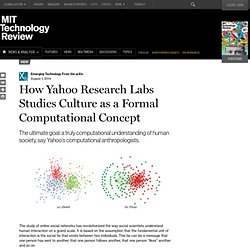
It is based on the assumption that the fundamental unit of interaction is the social tie that exists between two individuals. This tie can be a message that one person has sent to another, that one person follows another, that one person “likes” another and so on. These social ties are the atoms of social network structure. Need to know: About Facebook’s emotional contagion study. The 5 Biggest Cybersecurity Myths, Debunked.
Getty “A domain for the nerds.”
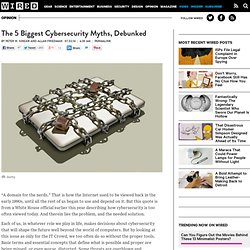
That is how the Internet used to be viewed back in the early 1990s, until all the rest of us began to use and depend on it. But this quote is from a White House official earlier this year describing how cybersecurity is too often viewed today. And therein lies the problem, and the needed solution. Best Tech Stories from Around the Web (Week Ending June 28, 2014) 3 UX Mistakes That Make Sites More Hackable. Do you know that the URL bar in your browser is a potential security hole?
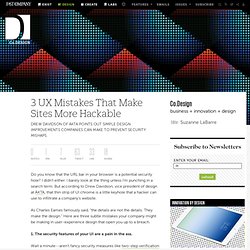
I didn't either. I barely look at the thing unless I'm punching in a search term. How to Find the Best Connected Individual in Your Social Network. The study of networks has exploded in recent years.
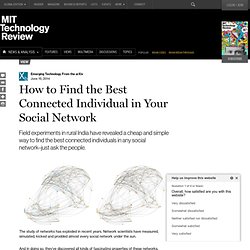
Network scientists have measured, simulated, kicked and prodded almost every social network under the sun. And in doing so, they’ve discovered all kinds of fascinating properties of these networks, properties that allow them to better understand the spread information and the role that people play in this process. The 9 Best Languages For Crunching Data. The big data frenzy continues.
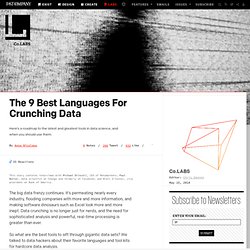
It’s permeating nearly every industry, flooding companies with more and more information, and making software dinosaurs such as Excel look more and more inept. Data crunching is no longer just for nerds, and the need for sophisticated analysis and powerful, real-time processing is greater than ever. So what are the best tools to sift through gigantic data sets? We talked to data hackers about their favorite languages and tool kits for hardcore data analysis. It would be downright negligent to start this list with any language other than R. 6Reactions But over the past few years, it’s become the golden child of data science--now a household name not only among nerdy statisticians, but also Wall Street traders, biologists, and Silicon Valley developers.
R has simple and obvious appeal. R’s greatest asset is the vibrant ecosystem has developed around it: The R community is constantly adding new packages and features to its already rich function sets. ONG Derechos Digitales – Page 1. 6:29 pm - Tue, May 20, 2014 1 note Únete a nosotros y mantente alerta e informado sobre cómo ejercer y cuidar nuestros derechos en el entorno digital.
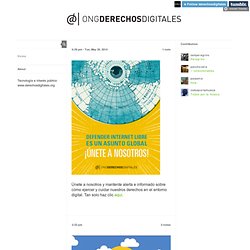
Tan solo haz clic aquí. 3:22 pm 3 notes La próxima semana se realizará en Suecia el Stockholm Internet Forum, una conferencia que tiene como objetivo profundizar el debate sobre cómo la libertad y la apertura en Internet pueden promover el desarrollo económico y social en todo el mundo. .Security of Things .Dan Geer, 7 May 14, Cambridge Thank you for your invitation and to the other speakers for their viewpoints and for the shared experience.
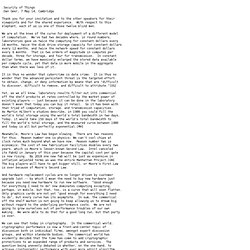
With respect to this elephant, each of us is one of those twelve blind men. We are at the knee of the curve for deployment of a different model of computation. Pierre Levy. Digital Humanities for beginners. Inteligencia Colectiva. Pierre Levy (plevy) en Twitter... Free stuff online. Curation. My Research in a Nutshell. The human species can be defined by its special ability to manipulate symbols. Each great augmentation in this ability has brought enormous economic, social, political, religious, epistemological, educational (and so on) changes. How the Internet Is Taking Away America’s Religion. Back in 1990, about 8 percent of the U.S. population had no religious preference.
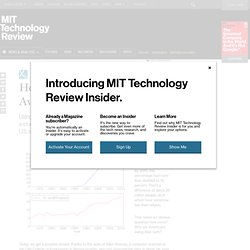
By 2010, this percentage had more than doubled to 18 percent. That’s a difference of about 25 million people, all of whom have somehow lost their religion. Volunteers in metadata study called gun stores, strip clubs, and more. Since November 2013, researchers at Stanford University have been asking: What’s in your metadata?
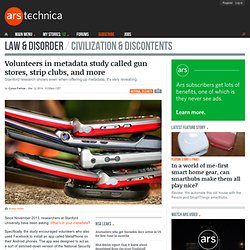
Specifically, the study encouraged volunteers who also used Facebook to install an app called MetaPhone on their Android phones. The app was designed to act as a sort of slimmed-down version of the National Security Agency by attempting to gather the same metadata collected by telecom firms, and in turn, intelligence agencies. Volunteers who chose to participate allowed the researchers access to their calling and texting data, the date and time, and the duration of the call.
Since late last year, the team has been releasing interim results from the 546 people that chose to participate. On Wednesday, the team released its latest and most complete findings and was startled by what it found. 5 examples of how the languages we speak can affect the way we think. Keith Chen (TED Talk: Could your language affect your ability to save money?)
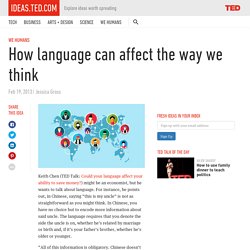
Might be an economist, but he wants to talk about language. For instance, he points out, in Chinese, saying “this is my uncle” is not as straightforward as you might think. In Chinese, you have no choice but to encode more information about said uncle. The language requires that you denote the side the uncle is on, whether he’s related by marriage or birth and, if it’s your father’s brother, whether he’s older or younger. Web Science Trust.